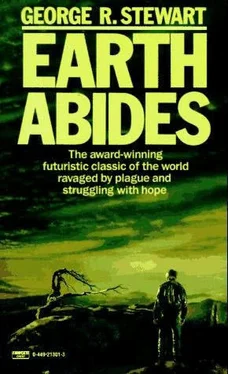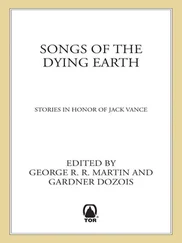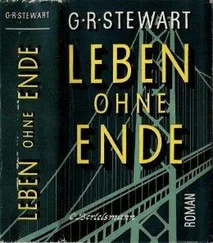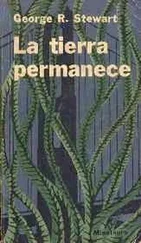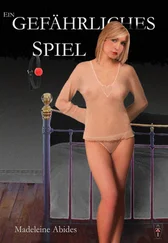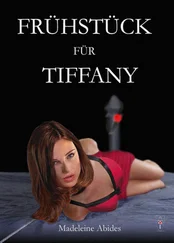At the main street of some other town he stopped, and blew a long blast on the horn. He had no real expectation that he would have any reply, but there was something about the look of this street which seemed more normal than those of other towns. Many cars were parked at the meters where each one showed the red flag of a violation. It might have been some Sunday morning with many cars parked overnight and the stores not yet open or people beginning to circulate. But it was not early morning, for now the sun was almost overhead. Then he saw what had made him pause, and what gave the place an illusion of animation. In front of a restaurant called The Derby a neon sign was still in full activity—a little horse galloping hard, its legs still going as actively as ever. In the full sunlight the faint pink glow was scarcely visible except for its motion. He looked, and as he looked, he caught the rhythm— one, two, three. (And at three the feet of the little horse were close tucked up under its body as if it were clear in the air.) Four —they came back to the half position, and the legs stretched out as if the body were low along the ground. One, two, three, four, it went. One, two, three, four. It galloped in a frenzy of activity still, and yet in all its galloping it arrived nowhere, and now even for most of its time it galloped with no eye to observe. As he looked, it seemed to him a gallant little horse, though a futile and a foolish one. The horse, suddenly he thought, was like that civilization of which man had been so proud, galloping so hard and yet never arriving anywhere; and sometime destined, when once the power failed, to grow still forever…
He saw smoke rising against the sky. His heart leaped up, and he turned quickly off on a side road, and drove toward the smoke. But even before he reached it, he knew that he would find no one there, and his spirit fell again. He drove up to the smoke, and saw then that it was a small farmhouse quietly beginning to burn up. There were many reasons, he decided, why a fire might start thus without people. A pile of greasy rags might ignite spontaneously, or some electric apparatus might have been left-on, or a motor in a refrigerator might jam and begin to burn. The little house was obviously doomed. There was nothing he could do, and no special reason why he should do it if he could. He turned around, and headed back to the highway…
He did not drive fast, and he stopped often to investigate, rather half-heartedly. Here and there he saw bodies, but in general he found only emptiness. Apparently the onset of the disease had been slow enough so that people were not usually struck down in the streets. Once he passed through a town where the smell of corpses was thick in the air. He remembered what he had read in the newspaper; apparently there had been concentrations at the last upon certain areas, and in these the corpses were now to be found most thickly. There was all too much evidence of death in that town and none of life. He saw no reason to stop to investigate. Surely no one would linger there longer than necessary.
In the late afternoon he came across the crest of the hills, and saw the Bay lie bright beneath the westering sun. Smokes rose here and there from the vast expanse of city, but they did not look like smokes rising from chimneys. He drove on toward the house where he had lived with his parents. He had no hope. Miracle enough it was that he himself had survived, miracle upon miracle if the plague had also spared the others of his own family!
From the boulevard he turned into San Lupo Drive. Everything looked much the same, although the sidewalks were not as well swept as the standard of San Lupo Drive required. It had always been a street of eminent respectability, and even yet, he reflected, it preserved decorum. No corpse lay on the street; that would be unthinkable in San Lupo Drive. He saw the Hatfields’ old gray cat sleeping on their porch-step in the sun, as he had seen her a hundred times before. Aroused by the sound of the car as he drove by, she rose up and stretched luxuriously.
He let the car roll to a stop in front of the house where he had lived so long. He blew two blasts on the horn, and waited. Nothing! He got out of the car, and walked up the steps into the house. Only after he had entered did he think it a little strange that the door was not even locked.
Inside, things were in good-enough order. He glanced about, apprehensively, but there was nothing at which a man would hesitate to look. He searched around the living-room for some note left behind to tell him where they had gone. There was no note.
Upstairs also everything looked much as usual, but in his parents’ bedroom both the beds were unmade. Perhaps it was that which made him begin to feel giddy and sick. He walked out of the room, feeling himself unsteady.
Holding by the rail, he made it downstairs again. “The kitchen!” he thought, and his mind cleared a trifle at the thought of something definite to do.
As he opened the swinging door, the fact of motion within the room struck his senses. Then he saw that it was only the second hand of the electric clock above the sink, steadily moving on past the vertical, beginning its long swoop toward six again. At that moment also he started wildly at a sudden noise, only to realize that the motor of the electric refrigerator, as if disturbed by his coming, had begun to whir. In quick reaction he was deathly ill, and found himself vomiting into the sink.
Recovered, he went out again, and sat in the car. He was no longer ill, but he felt weak and utterly despondent. If he made a detective-like investigation, searching in cupboards and drawers, he could probably discover something. But of what use thus to torture himself? The main part of the story was clear. There were no bodies in the house; of that at least lie could be thankful. Neither, he believed, would there be any ghosts—although the faithful clock and refrigerator were rather too ghost-like.
Should he go back into the house, or go somewhere else? At first he thought that he could not enter again. Then he realized that just as he had come here, so his father and mother, if by any chance they still lived, would also return here looking for him. After half an hour, overcoming repugnance, he went back into the house.
Again he wandered through the empty rooms. They spoke with all the pathos of any dwelling-place left without people. Now and then some little thing cried out to him more poignantly—his father’s new encyclopedia (purchased with qualms as to the expense), his mother’s potted pelargoniums (now needing water), the barometer that his father used to tap each morning when he came down to breakfast. Yes, it was a simple house—what you would expect of a man who had taught history in high school and liked books, and of a woman who had made it into a home for him and served on the Y.W.C.A. board, and of their only child—“He always does so well in his studies!”—for whom they had cherished ambitions and for whose education they had made sacrifices.
After a while he sat down in the living-room. Looking at the familiar chairs and pictures and books, he gradually came to feel less despondent.
As twilight fell, he realized that he had not eaten since morning. He was not hungry, but his weakness might be partly the result of lack of food. He rummaged around a little, and opened a can of soup. He found only the stub of a loaf of bread, and it was mouldy. The refrigerator supplied butter and stale cheese. He located crackers in a cupboard. The gas-pressure at the kitchen stove was very low, but he managed to warm up the soup.
Afterwards he sat on the porch in the dark. In spite of his meal he felt unsteady, and he realized that he was suffering from shock.
Читать дальше
